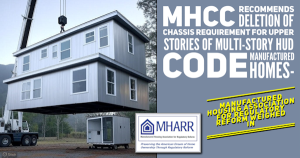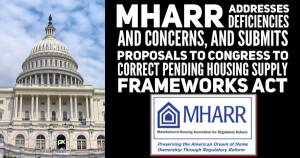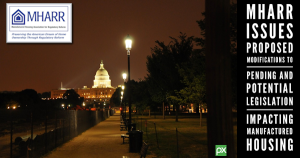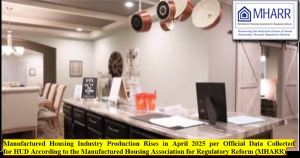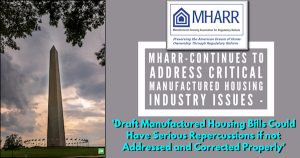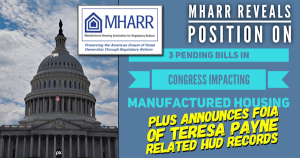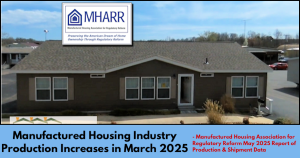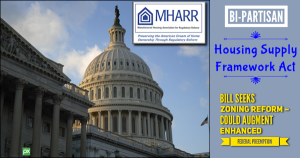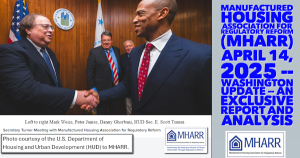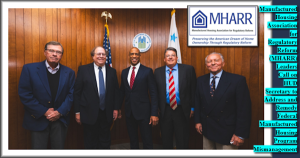MHARR Presents Comments at Federal Housing Finance Agency Duty To Serve “Listening Session”
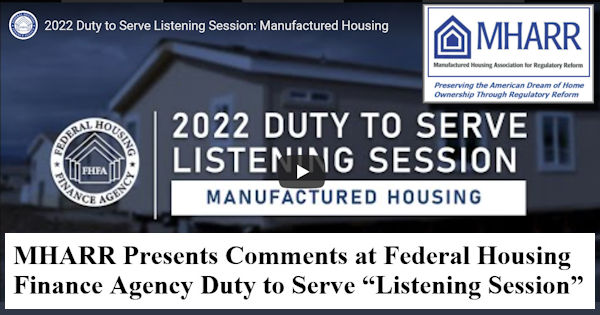
The Manufactured Housing Association for Regulatory Reform (MHARR) provided comments to the Federal Housing Finance Agency (FHFA) at a July 12, 2022 “Listening Session” regarding the 2022-2024 Duty to Serve Underserved Markets (DTS) plans filed by federal mortgage giants Fannie Mae and Freddie Mac (Enterprises).
While FHFA sought to target the listening session toward manufactured housing community “tenant lease protections,” MHARR, in its comments, again stressed the urgent need for market-significant securitization and secondary market support by the Enterprises for the entire spectrum of manufactured home personal property or “chattel” loans. Such loans, according to U.S. Census Bureau data, comprise nearly 80% of consumer loans for manufactured home purchases and provide access to the industry’s most affordable homes for otherwise qualified lower and moderate-income purchasers. The availability of chattel financing loans, moreover, through market-significant DTS support, is a necessary antecedent to any consideration of alleged “tenant protection” mechanisms.
However, since the adoption of the DTS mandate in 2008 and the subsequent inception of DTS oversight by FHFA, the Enterprises’ federal regulator, neither Fannie Mae nor Freddie Mac has ever implemented any program for the support of the market-dominant chattel loan sector. This has had the effect of limiting participation and competition within the chattel financing sector, allowing it to be dominated by a relative handful of portfolio lenders. Thus, in turn, has led to higher interest rates for such loans than would otherwise be the case with DTS-based market-significant securitization and secondary market support, resulting in needless borrowing costs for those able to qualify for such financing, disproportionately-high loan rejection levels, and the needless exclusion of otherwise qualified purchasers from the market, thus helping to fuel the ongoing national shortage of affordable housing and ownership.
While chattel loan “pilot” programs have previously been proposed by the Enterprises under DTS in the past, those programs were ultimately dropped in subsequent revisions and updates, and the same pattern is evident in the 2022-2024 DTS implementation plans. Fannie Mae’s plan, for example, offers no proposals whatsoever regarding DTS support for manufactured home chattel loans. Freddie Mac’s plan, meanwhile, does offer the prospect of a chattel “pilot program” in its third and final year, but that program is too small and too long delayed to provide the type of support envisioned by Congress under DTS, even if it is ultimately established and not simply eliminated in subsequent plan updates.
Accordingly, MHARR stated, in relevant part:
- The vast bulk of the manufactured housing consumer financing market has effectively been left untouched by DTS. Consequently, by any objective parameter, the failure of the Enterprises to serve the manufactured housing market has continued unabated regardless of DTS, and the DTS mandate, by definition, remains unfulfilled with respect to manufactured housing. Moreover, reporting the contrary to Congress, as FHFA has repeatedly done, constitutes a fundamental misrepresentation and a breach of FHFA’s responsibilities under EISA relating to DTS.
- At first, the excuse from Fannie Mae and Freddie Mac – which was accepted by FHFA – was that there was insufficient information and data regarding the performance of manufactured housing chattel loans to include them within DTS, even though Congress expressly envisioned and authorized their inclusion. (Thus making any parallel “examination” and/or “analysis” by the Enterprises superfluous.)
- This delay, based on an ostensible lack of relevant market information, was despite the fact that multiple private lenders within the manufactured housing market obviously have been – and remain – profitable within the existing chattel-dominated market.
- Based on this alleged lack of information and data, chattel “pilot” programs originally included in the Enterprises’ initial DTS plans were ultimately eliminated, again with FHFA’s acceptance.
- Subsequently, despite chattel loan performance data apparently being provided or becoming available, personal property loans continued to be excluded from the extended DTS implementation plans filed – and accepted by FHFA – during the 2020 – 2021 timeframe.
- And now, in the latest DTS plans, chattel loans are once again relegated – in Freddie Mac’s plan – to a small out-year “pilot” program, while they continue to be completely excluded from Fannie Mae’s plan altogether.
- With new leadership at FHFA, this needs to change. If the Biden Administration is intent on fulfilling its pledge to advance housing and homeownership for all Americans, including low, lower and moderate-income families, then the DTS mandate must be met and fulfilled with respect to the inherently affordable manufactured housing financed through personal property loans.
- In 2018, a team of scholars from the Urban Institute (UI), including now-Ginnie Mae President Alanna McCargo … found that “restrictive or unavailable financing” was one of the main impediments to the greater utilization of affordable manufactured housing.
- The same team, in a separately-published UI study, pointed out that appreciation rates for HUD Code manufactured homes and site-built homes “are actually similar after adjusting for geographic differences.”
- Put simply, if the Urban Institute team could reach these critical conclusions some four years ago, there is no legitimate reason to further delay programs at both Enterprises to provide market-significant support for manufactured home chattel lending.
- Such support is essential to the growth of the HUD Code market and to addressing the affordable housing shortage that President Biden has pledged to tackle through, among other things, his Housing Supply Action Plan.
MHARR, in its comments, therefore, urged FHFA to re-visit the entire issue of DTS support for the chattel sector as an urgent priority if the nation’s extreme and growing need for affordable housing and homeownership is to be addressed and President Biden’s recently-announced Housing Supply Action Plan is to be effectively implemented.
MHARR will continue to work for the full and market-significant implementation of DTS within the manufactured housing market and will keep you apprised of further developments.
cc: Other Interested HUD Code Industry Communities, Retailers and Finance Companies
Manufactured Housing Association for Regulatory Reform (MHARR)
1331 Pennsylvania Ave N.W., Suite 512
Washington D.C. 20004
Phone: 202/783-4087
Fax: 202/783-4075
Email: MHARR@MHARRPUBLICATIONS.COM
Website: manufacturedhousingassociation.org
The Manufactured Housing Association for Regulatory Reform (MHARR) provided comments to the Federal Housing Finance Agency (FHFA) at a July 12, 2022 “Listening Session” regarding the 2022-2024 Duty to Serve Underserved Markets (DTS) plans filed by federal mortgage giants Fannie Mae and Freddie Mac (Enterprises).
While FHFA sought to target the listening session toward manufactured housing community “tenant lease protections,” MHARR, in its comments, again stressed the urgent need for market-significant securitization and secondary market support by the Enterprises for the entire spectrum of manufactured home personal property or “chattel” loans. Such loans, according to U.S. Census Bureau data, comprise nearly 80% of consumer loans for manufactured home purchases and provide access to the industry’s most affordable homes for otherwise qualified lower and moderate-income purchasers. The availability of chattel financing loans, moreover, through market-significant DTS support, is a necessary antecedent to any consideration of alleged “tenant protection” mechanisms.
However, since the adoption of the DTS mandate in 2008 and the subsequent inception of DTS oversight by FHFA, the Enterprises’ federal regulator, neither Fannie Mae nor Freddie Mac has ever implemented any program for the support of the market-dominant chattel loan sector. This has had the effect of limiting participation and competition within the chattel financing sector, allowing it to be dominated by a relative handful of portfolio lenders. Thus, in turn, has led to higher interest rates for such loans than would otherwise be the case with DTS-based market-significant securitization and secondary market support, resulting in needless borrowing costs for those able to qualify for such financing, disproportionately-high loan rejection levels, and the needless exclusion of otherwise qualified purchasers from the market, thus helping to fuel the ongoing national shortage of affordable housing and ownership.
While chattel loan “pilot” programs have previously been proposed by the Enterprises under DTS in the past, those programs were ultimately dropped in subsequent revisions and updates, and the same pattern is evident in the 2022-2024 DTS implementation plans. Fannie Mae’s plan, for example, offers no proposals whatsoever regarding DTS support for manufactured home chattel loans. Freddie Mac’s plan, meanwhile, does offer the prospect of a chattel “pilot program” in its third and final year, but that program is too small and too long delayed to provide the type of support envisioned by Congress under DTS, even if it is ultimately established and not simply eliminated in subsequent plan updates.
Accordingly, MHARR stated, in relevant part:
- The vast bulk of the manufactured housing consumer financing market has effectively been left untouched by DTS. Consequently, by any objective parameter, the failure of the Enterprises to serve the manufactured housing market has continued unabated regardless of DTS, and the DTS mandate, by definition, remains unfulfilled with respect to manufactured housing. Moreover, reporting the contrary to Congress, as FHFA has repeatedly done, constitutes a fundamental misrepresentation and a breach of FHFA’s responsibilities under EISA relating to DTS.
- At first, the excuse from Fannie Mae and Freddie Mac – which was accepted by FHFA – was that there was insufficient information and data regarding the performance of manufactured housing chattel loans to include them within DTS, even though Congress expressly envisioned and authorized their inclusion. (Thus making any parallel “examination” and/or “analysis” by the Enterprises superfluous.)
- This delay, based on an ostensible lack of relevant market information, was despite the fact that multiple private lenders within the manufactured housing market obviously have been – and remain – profitable within the existing chattel-dominated market.
- Based on this alleged lack of information and data, chattel “pilot” programs originally included in the Enterprises’ initial DTS plans were ultimately eliminated, again with FHFA’s acceptance.
- Subsequently, despite chattel loan performance data apparently being provided or becoming available, personal property loans continued to be excluded from the extended DTS implementation plans filed – and accepted by FHFA – during the 2020 – 2021 timeframe.
- And now, in the latest DTS plans, chattel loans are once again relegated – in Freddie Mac’s plan – to a small out-year “pilot” program, while they continue to be completely excluded from Fannie Mae’s plan altogether.
- With new leadership at FHFA, this needs to change. If the Biden Administration is intent on fulfilling its pledge to advance housing and homeownership for all Americans, including low, lower and moderate-income families, then the DTS mandate must be met and fulfilled with respect to the inherently affordable manufactured housing financed through personal property loans.
- In 2018, a team of scholars from the Urban Institute (UI), including now-Ginnie Mae President Alanna McCargo … found that “restrictive or unavailable financing” was one of the main impediments to the greater utilization of affordable manufactured housing.
- The same team, in a separately-published UI study, pointed out that appreciation rates for HUD Code manufactured homes and site-built homes “are actually similar after adjusting for geographic differences.”
- Put simply, if the Urban Institute team could reach these critical conclusions some four years ago, there is no legitimate reason to further delay programs at both Enterprises to provide market-significant support for manufactured home chattel lending.
- Such support is essential to the growth of the HUD Code market and to addressing the affordable housing shortage that President Biden has pledged to tackle through, among other things, his Housing Supply Action Plan.
MHARR, in its comments, therefore, urged FHFA to re-visit the entire issue of DTS support for the chattel sector as an urgent priority if the nation’s extreme and growing need for affordable housing and homeownership is to be addressed and President Biden’s recently-announced Housing Supply Action Plan is to be effectively implemented.
MHARR will continue to work for the full and market-significant implementation of DTS within the manufactured housing market and will keep you apprised of further developments.
cc: Other Interested HUD Code Industry Communities, Retailers and Finance Companies
Manufactured Housing Association for Regulatory Reform (MHARR)
1331 Pennsylvania Ave N.W., Suite 512
Washington D.C. 20004
Phone: 202/783-4087
Fax: 202/783-4075
Email: MHARR@MHARRPUBLICATIONS.COM
Website: manufacturedhousingassociation.org

